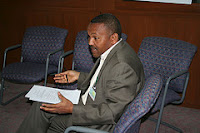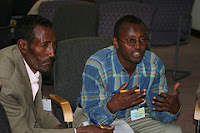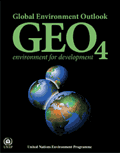-
PODCAST – Simulated Negotiations for Integrated Development in East Africa
›December 7, 2007 // By Geoffrey D. DabelkoI recently traveled to Ethiopia to attend “Population, Health, and Environment: Integrated Development for East Africa,” a conference sponsored by the Population Reference Bureau (PRB) and LEM Ethiopia. The conference was attended by more than 200 development practitioners from around the world, including many from Rwanda, Uganda, Tanzania, Kenya, and Ethiopia. For the meeting, I worked with my colleague Gib Clarke and Shewaye Deribe (pictured above) of the Ethio Wetlands and Natural Resources Association to write and conduct a role-playing simulation designed to bring to life the connections between population growth, natural resource management and environmental health, and development priorities. Participants worked with a scenario involving competing interests and rising tensions among a range of internal and external stakeholders in the fictional nation of Arborlind.
For the meeting, I worked with my colleague Gib Clarke and Shewaye Deribe (pictured above) of the Ethio Wetlands and Natural Resources Association to write and conduct a role-playing simulation designed to bring to life the connections between population growth, natural resource management and environmental health, and development priorities. Participants worked with a scenario involving competing interests and rising tensions among a range of internal and external stakeholders in the fictional nation of Arborlind.  Four teams representing government, civil society, a donor, and the private sector negotiated responses to short-term opportunities and long-term risks.
Four teams representing government, civil society, a donor, and the private sector negotiated responses to short-term opportunities and long-term risks.
This podcast gives you a taste of the trip–specifically the simulation. We begin and end the audio with the voices of local children welcoming some of us to their school at the Berga Wetland Project, an especially inspiring inauguration to a valuable conference. -
Illegal Logging Threatens Ecosystems, Communities
›December 4, 2007 // By Miles BrundageThe soaring global demand for timber, driven in part by China’s economic growth, is making it increasingly tempting for timber companies to ignore the law when seeking new sources of wood. When they do not ask indigenous people’s permission for the use of their land or compensate them for it, illegal loggers jeopardize communities’ livelihoods, threaten traditional customs and values, and, of course, deprive them of the revenue gained from the sale timber.
No one knows this better than Frederick Sagisolo, chief of the Knasaimos people of Seremuk, in the Indonesian province of Papua, who gives a startling account of the plundering of his community’s land by illegal loggers. Despite being head of the Knasaimos tribal council, Sagisolo says he was not contacted by the company that logged his community’s forest. “Instead it did an illegal deal with one individual from our community, and this created many problems for us. But the company was backed by a local military officer, so what could we do?” The logging finally stopped in 2005, when the Indonesian government launched a major initiative against illegal logging, part of which targeted Papua.
Illegal logging can be fueled by problems that face many countries, including a lack of equitable law enforcement in scarcely populated areas and graft involving local officials and foreign companies. As a result of these and other issues, forests are being logged illegally in places as varied as Brazil and Estonia.
Despite President Bush’s initiative against illegal logging and many other efforts around the world, economic incentives to supply cheap and illegal timber seem to be increasing. If more isn’t done to curb illegal logging, we will continue seeing its effects crop up around the world, ranging from ecosystem destruction to increased damage from natural disasters. -
Environmentalists and Indigenous Peoples: Natural Allies?
›December 4, 2007 // By Thomas RenardThe Gran Chaco of Bolivia, Argentina, Paraguay, and Brazil is one of South America’s most extensive biogeographical regions. It is characterized by diverse ecosystems and is inhabited by, among others, the 10,000 indigenous Guaraní people known as the Isoceños. However, Bolivia’s Chaco, the most unspoiled portion, is being degraded by ranching, farming, commercial hunting, highway construction, and the development of Bolivia’s natural gas industry, threatening the livelihoods of the Isoceños.
In 1991, the Wildlife Conservation Society (WCS) and the Capitanía de Alto y Bajo Izozog (CABI), an indigenous organization representing the Isoceños, began working together to protect the Bolivian Chaco. The cooperation was highly successful, resulting in the creation of the Kaa-Iya del Gran Chaco National Park and Integrated Management Area in 1995, which designates millions of hectares as a protected national park and another million as “indigenous territory.” For WCS, this successful collaboration is evidence that environmental groups and indigenous peoples can—and should—work together to maximize their influence.
More recently, in the Democratic Republic of the Congo (DRC), environmental and Pygmy organizations united to press the World Bank to cease industrial logging in the DRC; grant the Pygmies greater input into forest issues; carry out a comprehensive assessment of logging’s environmental impacts; and encourage the development of environmentally friendly industries.
Conservationists and indigenous peoples have more leverage when they speak with one voice. However, there is often distrust between the two sides. Conservationists may accuse indigenous peoples of contributing to the degradation of a fragile ecosystem. Conversely, indigenous peoples can fear their livelihoods will be threatened by the creation of protected areas. In India, for instance, members of aboriginal tribes are now banned from gathering non-timber forest products such as honey, wild herbs, and fruits from parks and wildlife sanctuaries for commercial purposes. In the past, many of these tribes relied heavily on gathering and selling these products for their livelihoods.
In the future, the challenge will be finding sustainable solutions that satisfy both groups. This problem has no silver bullet. Instead, the commitment, imagination, and negotiating skills of the actors will make the difference. -
UNEP Releases 4th Global Environmental Assessment
›November 2, 2007 // By Rachel Weisshaar Major environmental challenges—including land degradation and desertification, pollution, and climate change—demand swift, concerted global action, say the authors of Global Environmental Outlook: Environment for Development (GEO-4), which was recently published by the UN Environment Programme (UNEP). Assessing the state of the Earth’s atmosphere, land, water, and biodiversity, the 572-page report finds that as the global population grows and consumes increasing amounts of natural resources, it threatens the health of essential ecological assets ranging from fish stocks to fertile land to freshwater. GEO-4 identifies the most pressing environmental issues confronting each region of the world, and offers policymakers specific recommendations for responding to these challenges.
Major environmental challenges—including land degradation and desertification, pollution, and climate change—demand swift, concerted global action, say the authors of Global Environmental Outlook: Environment for Development (GEO-4), which was recently published by the UN Environment Programme (UNEP). Assessing the state of the Earth’s atmosphere, land, water, and biodiversity, the 572-page report finds that as the global population grows and consumes increasing amounts of natural resources, it threatens the health of essential ecological assets ranging from fish stocks to fertile land to freshwater. GEO-4 identifies the most pressing environmental issues confronting each region of the world, and offers policymakers specific recommendations for responding to these challenges.
For the first time, the assessment includes explicit analysis of the linkages between the environment and conflict. ECSP Director Geoff Dabelko served as one of the lead authors of Chapter 7, “Vulnerability of People and the Environment: Challenges and Opportunities,” which explores the relationship between environmental change and security using the concept of human vulnerability. The authors emphasize that the poor are the most susceptible to the stresses caused by degraded environments, and suffer disproportionately from land degradation, water contamination and scarcity, and increasingly frequent and severe natural disasters.
“A combination of environmental change, resource capture and population growth decreases the per capita availability of natural resources, and can threaten well-being for large segments of societies, particularly the poorest who depend on these natural resources for survival. The resulting social effects—migration, intensified unsustainable behavior and social sub-grouping—strain the state’s ability to meet its citizens’ demands, and can contribute to violent outcomes,” write the authors. They recommend reducing people’s vulnerability to environmental and socio-economic changes by bolstering the resource rights of local people; promoting sustainable livelihoods; improving communities’ natural disaster coping capabilities; and empowering women and other historically disadvantaged groups. They also urge the integration of environmental considerations into broader development activities, so that development will be sustainable and will help, not harm, a country’s poorest members.
UNEP has spearheaded a range of efforts analyzing environment, conflict, and security connections. Its Post-Conflict and Disaster Management Branch (PCDMB) conducts scientific assessments of environmental conditions in conflict and post-conflict settings. The Woodrow Wilson Center recently hosted the U.S. launch of PCDMB’s June 2007 Sudan Post-Conflict Environmental Assessment. In 2003, UNEP’s Division of Early Warning and Assessment (DEWA) took a broader look at the links between environment and conflict with the publication of Understanding Environment, Conflict, and Cooperation. -
An (Un)natural Disaster in Nicaragua
›October 26, 2007 // By Rachel WeisshaarNicaragua is currently struggling to cope with the effects of a double environmental disaster. In September 2007, Hurricane Felix tore through the country’s impoverished northern Caribbean region, killing more than 100 people, leaving 220,000 homeless, and destroying vast amounts of agricultural land and forests.
But that wasn’t all. Fifty days of heavy rains—starting just before the hurricane hit—have continued the destruction, causing flooding in large areas of the country’s Pacific regions. In response, President Daniel Ortega’s government declared a state of national disaster on October 19. SINAPRED, Nicaragua’s disaster relief agency, estimates that the rains destroyed the homes of another 216,000 people.
The international response has been rapid, with numerous countries, international agencies, and NGOs sending aid to Nicaragua. But Laura de Clementi, the UN Food and Agriculture Organization representative to Nicaragua, warns that unless seeds are quickly purchased, distributed, and planted, parts of the country could face severe food shortages in the coming months.
These natural disasters have an unnatural component, however, reports Inter Press Service: deforestation. Of the 8 million acres of forest in the country in 1950, only 3 million remain, according to the country’s Environment Ministry. Deforestation exacerbated the damage done by Hurricane Felix and the rains, increasing the level of soil erosion and boosting the likelihood of landslides. Ironically—and unfortunately—a government plan to reforest 60,000 hectares each year that began just before the hurricane hit has since been put on hold.
“Nicaragua is not to blame for the hurricanes and storms, but it is responsible for the destruction of its forests, which form a protective barrier. Rain causes greater damage to land stripped of its trees than to forested areas,” biologist and geographer Jaime Incer Barquero told IPS. Yet the people who cut down trees are often impoverished, possessing few other ways to earn a living. An effective plan to combat deforestation will need to establish alternative, environmentally sustainable livelihoods for Nicaragua’s poor communities. These sustainable ways of generating income would also bolster—rather than undermine—the country’s natural protections against disasters, contributing to the security of all Nicaraguans. -
Arctic Update
›October 25, 2007 // By Rachel WeisshaarThe U.S. National Oceanic and Atmospheric Administration (NOAA) recently issued a “report card” for the Arctic, which warned that the polar ice cap is melting rapidly, and that air temperatures continue to rise. A brief sampling of stories covering the implications of this warming, melting Arctic.
“Cold Rush: The Coming Fight for the Melting North,” in the September 2007 issue of Harper’s magazine (subscription required), offers a behind-the-scenes look at Canada’s uncharacteristically forceful assertions of its ownership of Arctic territory—particularly the storied Northwest Passage.
Canada is not the only country trying to gain an advantage in the North. The U.S. Coast Guard plans to establish a new base in Barrow, Alaska as early as the spring of 2008, reports the Associated Press. The base would monitor ship traffic in the Arctic waters, which is expected to increase as more areas remain free of ice for longer periods of time.
The Arctic’s rapidly changing climate is threatening cultural resources, as well as natural ones. Glenn Morris, a fellow of the Royal Geographic Society, is leading a four-person team on a 3,000-mile expedition by kayak and dogsled to record the Inuit’s impressions of their rapidly changing environment. Morris wrote about the first stage of the expedition for the BBC; in the second and final stage, to be carried out in the summer of 2008, the team will kayak the Northwest Passage. -
ECSP, Project on Emerging Nanotechnologies Dive Into New Media
›August 10, 2007 // By Rachel WeisshaarThe newest podcast from the Wilson Center’s Project on Emerging Nanotechnologies highlights how engineers are using nanotechnology to develop more efficient and cost-effective ways to desalinate seawater and purify wastewater. In the future, these new water purification technologies could be adapted for use in poor countries where access to safe water is limited. The podcast is the third in the “Trips to the Nano Frontier” series, which also includes podcasts on green nanotechnology and nanomedicine. The full series is available online.
The Center’s Environmental Change and Security Program (ECSP) also produces an original podcast series. ECSP’s podcasts, which feature interviews with leading scholars and practitioners, have examined the role of gender in population, health, and environment programs; the challenges and opportunities presented by urban population growth; and the link between international trade and aid policies and conflict.
-
University Podcasts Opening Up the Classroom
›August 2, 2007 // By Sean PeoplesI started taking courses at Berkeley last night—sort of. From the comfort of my own home (and comfy couch), I listened to Professor Nathan Sayre’s “Natural Resources and Population” course lectures on my iPod. I can take the course at my own pace, following along with the online course syllabus and listening in whenever I want. The only foreseeable drawback is that Professor Sayre will not call on me when my brain is teeming with questions.
Berkeley isn’t the only university opening its classrooms to eager dilettantes. Stanford University, Texas A&M;, Duke University, Penn State, and many more universities and colleges are offering free, downloadable podcasts of myriad elective and core courses.
Showing posts from category environment.


 For the meeting, I worked with my colleague
For the meeting, I worked with my colleague  Four teams representing government, civil society, a donor, and the private sector negotiated responses to short-term opportunities and long-term risks.
Four teams representing government, civil society, a donor, and the private sector negotiated responses to short-term opportunities and long-term risks.  Major environmental challenges—including land degradation and desertification, pollution, and climate change—demand swift, concerted global action, say the authors of
Major environmental challenges—including land degradation and desertification, pollution, and climate change—demand swift, concerted global action, say the authors of 

